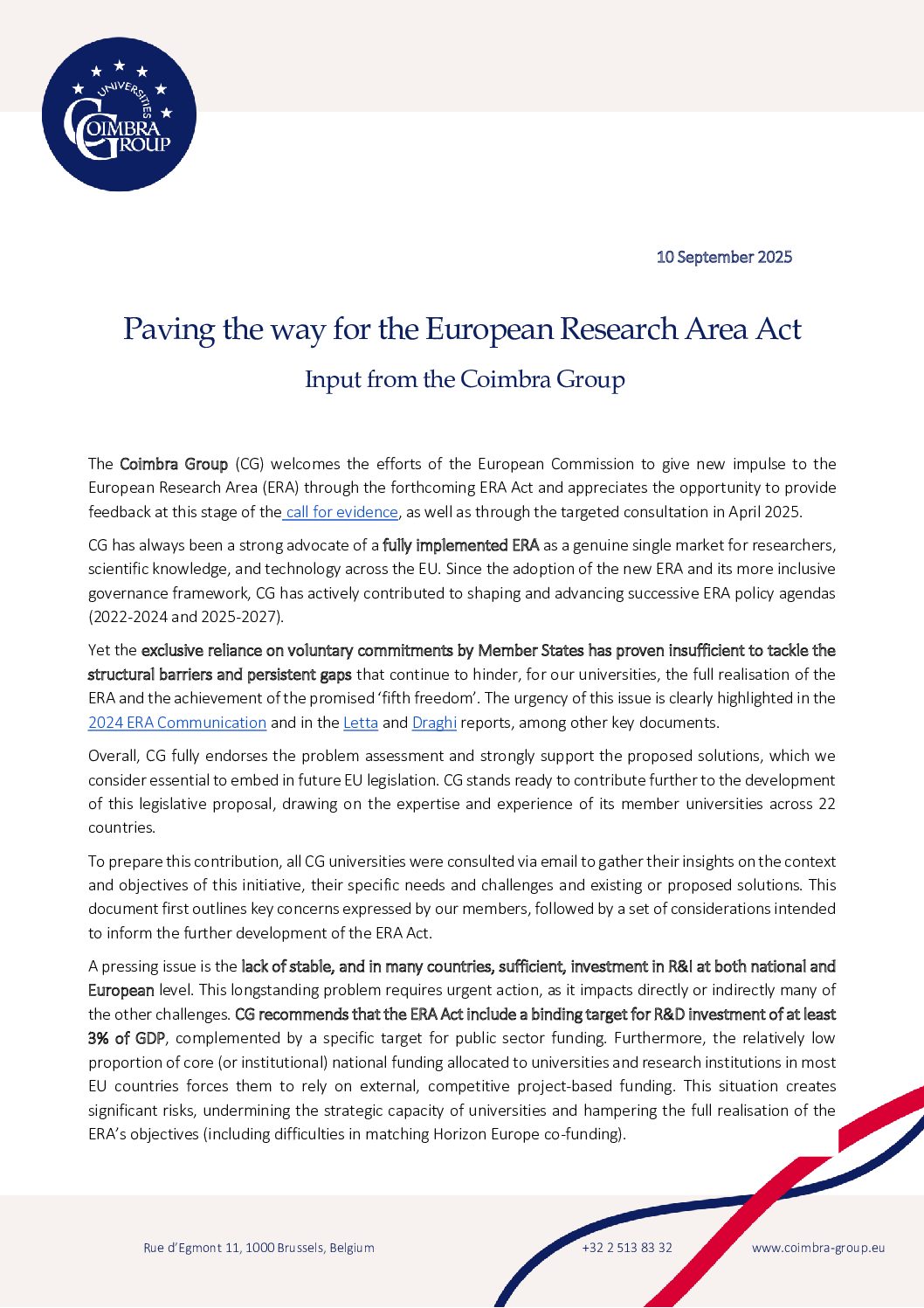Paving the way for the European Research Area Act
11 September 2025
Coimbra Group’s input to the European Commission’s Call for Evidence for the European Research Area Act

The Coimbra Group (CG) has submitted its feedback to the European Commission’s Call for Evidence on the forthcoming European Research Area (ERA) Act. We welcome the Commission’s initiative to strengthen the ERA and value the opportunity to engage in this important step toward shaping its future.
For many years, CG has been a committed advocate of a fully implemented ERA as a genuine single market for researchers, scientific knowledge, and technology across Europe. Since the launch of the renewed ERA and its inclusive governance framework, we have contributed actively to successive ERA policy agendas (2022–2024 and 2025–2027), bringing the perspectives and expertise of our member universities.
At the same time, our experience shows that voluntary commitments by Member States alone are not sufficient to remove the structural obstacles that persistently hold back the ERA’s full potential and the achievement of the promised “fifth freedom”. This urgency has been echoed in the 2024 ERA Communication and in recent reports by Enrico Letta and Mario Draghi, among other key documents.
Overall, we strongly support the European Commission’s problem assessment and endorse the solutions proposed. We believe these measures are essential to ensure the ERA becomes a tangible reality, underpinned by EU legislation. CG stands ready to further contribute to the legislative process, drawing on the collective knowledge and experience of our member universities in 22 countries.
Based on the needs and considerations expressed by CG members, the following actions could guide the development of the ERA Act or related EU legislative acts:
- Integrate a binding target of at least 3% of GDP for investment in R&D, complemented by a specific target for public sector funding.
- Reinforce institutional autonomy: an ERA act could potentially further enshrine this principle, for instance, by laying the basis for a system of “ombudsmen” or similar, that could react to infringements of institutional autonomy.
- Simplify and harmonise visa and residence rules for international researchers.
- Strengthen and streamline legal and financial safeguards to enable universities and their researchers to focus primarily on research and fully benefit from the realisation of the ERA.
- Recognize challenges specific to gender and support inclusive policies for disabled and minority staff.
- Establish common minimum standards for researcher careers and contracts, while preserving institutional flexibility.
- Support sustainable infrastructures and staffing for Open Science, including FAIR publishing models.
- Advance recognition and assessment reforms in line with CoARA principles, recognising diverse research outputs (regardless of format or language) and valuing researchers’ broader contributions to society.
- Provide clarity and incentives for university–business cooperation, including recognition of knowledge transfer in assessment frameworks.
- Better protect fundamental academic values, starting with institutional autonomy and academic freedom. This could also include safeguards for whistle-blowers.
- Create a harmonised framework for a sustainable, equitable Open Science ecosystem.
- Strengthen digital sovereignty, reduce reliance of universities on proprietary providers and closed, non-interoperable systems.
- Collect reliable national-level data on research careers and mobility (including at PhD level).
- Ensure the portability of pensions and social benefits for researchers.



